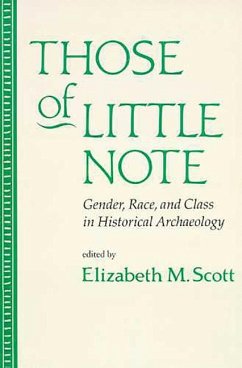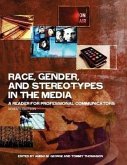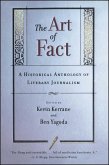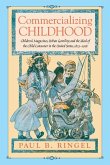Because some classes of people may not have been considered worthy of notice by dominant social groups in the past, they may be less visible to us today in historical and archaeological records; consequently, they remain less studied. This volume attempts to redress this oversight by presenting case studies of historical and archaeological research on various ethnic, racial, gender, and socioeconomic groups in colonial and post-colonial North America. These contributions illustrate how historical archaeologists and ethnohistorians have used documentary and archaeological evidence to retrieve information on neglected aspects of American history. They explore ways of making more visible Native Americans, African Americans, and Euro-Americans of differing ethnic groups and economic classes, and also shed new light on such groups as celibate religious communities, women in predominantly male communities, and working-class and middle-class women in urban communities. Material evidence on "those of little note" provides not only fresh insight into our understanding of daily life in the past, but also a refreshing counterpoint to the male- and Euro-centered analysis that has characterized much of historical archaeology since its inception. Readers will find many chapters rewarding in their application of sophisticated feminist theory to archaeological data, or in their probing of complex relational issues concerning the construction of gender identity and gender relationships. As the first archeaeologically-focused collection to examine the interconnectedness of gender, class, race, and ethnicity in past societies, "Those of Little Note" sets new standards for future research.CONTENTS I--Introduction 1. Through the Lens of Gender: Archaeology, Inequality, and Those "Of Little Note" / Elizabeth M. Scott II--Native American and African American Communities 2. Cloth, Clothing, and Related Paraphernalia: A Key to Gender Visibility in the Archaeological Record of Russian America / Louise M. Jackson 3. "We Took Care of Each Other Like Families Were Meant To": Gender, Social Organization, and Wage Labor Among the Apache at Roosevelt / Everett Bassett 4. The House of the Black Burghardts: An Investigation of Race, Gender, and Class at the W. E. B. DuBois Boyhood Homesite / Nancy Ladd Muller III--All Male and Predominantly Male Communities 5. "With Manly Courage": Reading the Construction of Gender in a 19th-Century Religious Community / Elizabeth Kryder-Reid 6. The Identification of Gender at Northern Military Sites of the Late 18th Century / David R. Starbuck 7. Class, Gender Strategies, and Material Culture in the Mining West / Donald L. Hardesty IV--Working Women in Urban Communities 8. Mrs. Starr's Profession / Donna J. Seifert 9. Diversity and 19th-Century Domestic Reform: Relationships Among Classes and Ethnic Groups / Suzanne M. Spencer-Wood
Hinweis: Dieser Artikel kann nur an eine deutsche Lieferadresse ausgeliefert werden.
Hinweis: Dieser Artikel kann nur an eine deutsche Lieferadresse ausgeliefert werden.







